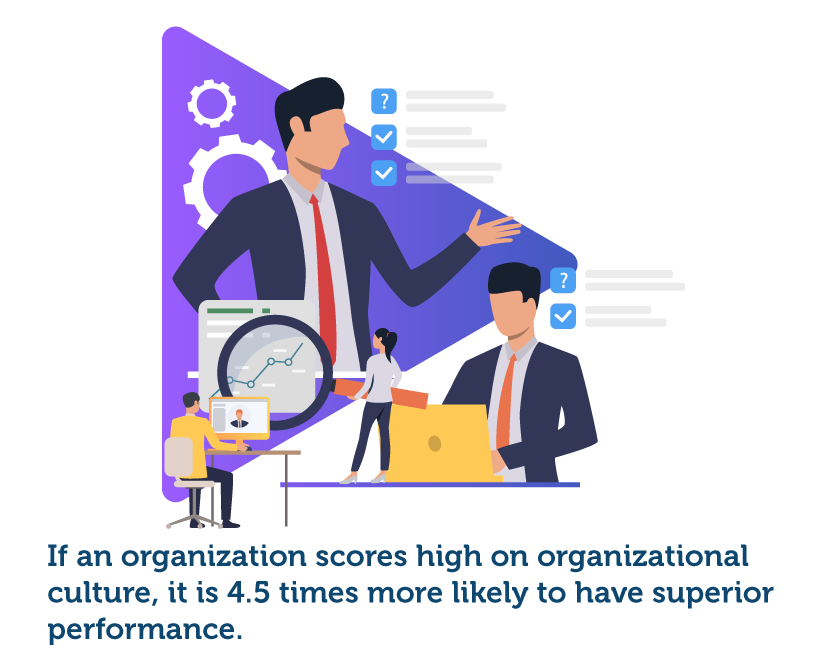
What’s Integrity in the Workplace?
Can leaders truly build resilient and trustworthy businesses by integrating ethical considerations into the fabric of their organization?


CEO of Miroma Project Factory

Book Writing Coach

Head of Content at Personnel Checks

CEO & Owner of Superstar SEO

Motivational Speaker

Digital Marketing Manager of Explainerd
As global employment trends keep shifting, the need for robust organizational leadership to steer companies through uncertain times keeps growing. Employees and companies
Hence, we come to the central question of this article: what’s better, organizational power or organizational leadership? And can we have one without the other?
Simplified, organizational power and leadership are related concepts in managing and influencing people, but the approaches tend to differ.
Organizational power often involves control over resources, information, or decision-making processes. It can be formal, derived from one’s position in the corporate hierarchy, or informal, stemming from personal relationships, expertise, or other factors.
On the other hand, organizational leadership is guiding, inspiring, and influencing individuals or groups within an organization to achieve common goals. Leadership primarily concerns vision, direction, developing people’s abilities, and commitment to the mission.
Organizational power is about influence and control within an organization.
It is a crucial aspect of organizational dynamics in regard to how the work gets done and how important decisions are made. It can be both formal and informal, and it can be derived from various sources.
As with any power, it can come from different sources, including:
What’s more important, though, is how organizational power can be used to influence:
However, the use of power can have both positive and negative consequences.
When used effectively and responsibly, power can facilitate coordination, collaboration, and goal achievement. The misuse of power or the exercise of power solely for self-interest can lead to conflicts, resistance, and organizational dysfunction.
It’s important to note that organizational power dynamics can vary widely from one organization to another and change over time. Influential leaders and managers often need to navigate these power dynamics to ensure that power is used to align with the organization’s goals and values and promote a healthy and productive work environment.
Organizational leadership refers to the process of strategically motivating and guiding employees to meet a common goal – organizational success.
While the approach and methods used may differ between different leadership styles, all leadership roles encompass the following skills:
Is there a difference between organizational leadership and leadership?
The answer is, sort of.
Broadly speaking, leadership is the process of influencing others. On the other hand, organizational leaders focus on managing the company and its individuals.
This people-oriented management approach means that outside of conventional leadership methods, leaders must also utilize action-based and results-based strategies to motivate and empower employees.
All professionals – regardless of their position or title – need leadership skills to succeed in their careers. Typically, organizational leadership skills are mainly required for:

An organization without competent leaders has no direction. The CEO of Miroma Project Factory, Kat Robinson, uses the metaphor of an umbrella to discuss the importance of a leader.
They said, “A good analogy for leadership to me is an umbrella. You sometimes require a walking stick when the weather is great, and you need to hold up the sky when it’s raining cats and dogs. Often best passed to another when not required and always wanted in the boot of a car.
Having a great leader makes the team feel supported, embraced, empowered and that they have the space to grow and embrace new ideas.”
A great organizational leader excels at identifying each employee’s strengths and talents and using those skills to benefit the company and its people. Great managers can boost an employee’s productivity by 11% per employee.
Book Writing Coach Joanne Martin expressed that leadership is integral to life and work. She added,

On the other hand, appointing a bad leader can negatively impact an organization with devastating consequences.
Reports say that 75% of employees think their direct line manager is the worst part of their job. Moreover, 65% reported that they would happily take a pay cut if they could replace their boss with someone better.
There is a lot of truth in the saying, “People don’t leave bad jobs; they leave bad managers.” As much as 75% of people quit their job to “get away from their manager at some point in their career,” according to one study.
To summarize, we can derive a strong relationship between effective leadership and organizational performance.
Companies with the highest leadership development levels perform better in business, financial, and leadership outcomes.

Organizational power can be both positive and negative.
It can be used for constructive purposes, such as facilitating teamwork and achieving organizational objectives, or for more self-serving and detrimental purposes. It can also be wielded through authority, coercion, rewards, or expertise.
Organizational leadership is generally viewed as a positive and constructive force.
Effective guidance promotes collaboration, motivates employees, and fosters a positive organizational culture. It focuses on inspiring and empowering individuals to work towards a shared vision.
Because it is not solely based on position or authority, it can emerge from personal qualities, skills, and the ability to inspire and influence others through vision, communication, and interpersonal relationships.
On the other hand, organizational power usually includes some form of formal authority.
Even though similar, these two concepts also differ in their approach.
Power can be exercised in various ways, including command and control, manipulation, and coercion. It often focuses on achieving specific outcomes or compliance. Leadership typically involves a more collaborative and inspirational approach. Influential leaders build trust, communicate a compelling vision, and engage people in a way that fosters commitment and enthusiasm.
Is management the same as leadership?
An age-old debate, where many believe the roles are different, while others think their skills as a manager are synonymous with being a leader. Organizational leadership indeed includes a more comprehensive scope of responsibility than traditional management.
Typically, leaders are the big-picture thinkers and visionaries, while the managers are the ones who “get things done” and follow leadership directives.
However, as the workplace evolves, the line between the leader’s and manager’s roles continues to blur. As a result, nowadays, a manager’s role is more supervisory, with 70% of a team’s engagement being influenced by their manager.
Furthermore, the old “traditional” role of a boss simply does not fit in today’s workforce. Employees expect managers to be more of a coach and mentor than a boss.
James Parkinson, Head of Marketing Content at Personnel Checks, expands on this by stating, “In a world where many businesses have embraced hybrid or remote working, it is essential that a good manager can trust their employees to fulfill their tasks even if they aren’t on site – try and avoid micro-managing.
Maintaining a happy and healthy work environment where employees feel capable, appreciated, and enjoy their work is essential.
Leaders should be comfortable stepping back and letting their teams do their jobs, providing support and guidance as needed.
They need to stay in touch with their teams and inspire confidence when it comes to asking for help without being overbearing. Managers need to trust that their reports are capable of their day-to-day responsibilities, without them needing to be with them on a regular basis.”
CEO and owner of Superstar SEO, Chris M. Walker, adds to this by stating, “Having a leader that will guide his subordinates with a “getting things done” mindset means that they are able to focus on the task at hand and not be distracted by outside factors.
I know that the workplace has changed dramatically in the last few years, factoring in with the pandemic where most have shifted to a hybrid or remote work setting. With the rise of technology, the way we work has evolved; you need to have this mindset.”
Undoubtedly, culture is a significant factor in the success of an organization.
Corporate culture strongly influences the performance and effectiveness of a company, the productivity and morale of its employees, and a leader’s growth. Studies show that if an organization scores high on organizational culture, it is 4.5 times more likely to have superior performance on all combined business outcomes.
Organizational culture and leadership go hand in hand, and each directly influences the other. Leaders act as cultural stewards, establishing, promoting, and reinforcing an organization’s values and shared beliefs.
In many ways, the culture of a company is a reflection of its leader.
Unfortunately, many leaders are unaware of the significant effect culture has or don’t truly understand their culture. Surprisingly, 63% of C-suite executives think they have a strong culture, but only 41% of employees agree. Leaders must foster healthy debates, gather feedback, and connect with people across all departments and levels to see the organization’s cultural reality.
Generally, employees want to work in an open environment where they can speak freely and be treated respectfully and where the leaders promote honesty and transparency. Motivational speaker Ryan Zofay shared the crucial steps that need to be taken to become a good leader.
He said, “To start, it is important to be respected, so you must respect those you are leading. It is important to listen to your entire team, hear them out, praise them when they do good and make progress. Offer constructive criticism in a professional manner.
Critical thinking is, in my opinion, the most important skill to have.
You need to be able to make fast decisions while also considering every possible outcome. This also applies when remembering that the people you work with all think differently and come from all different walks of life.
You need to be able to be empathetic (with boundaries) and understanding of all views. This will also help you explain things better to your team when you have a better understanding of their view.
Communication skills, whether it is verbal or in writing, need to be clear, professional, but also friendly. You have to be willing to work well under pressure, with deadlines, and act quickly towards solutions.”

Did you know that globally there is a leadership quality gap that keeps getting bigger?
Studies find that 48% of leaders think their company has high-quality leadership, while only 28% of HR professionals say the same. This massive disparity shows that HR is more aware of the skills leaders lack to meet future challenges. Moving forward, HR can close this gap by developing a strong leadership pipeline and helping future leaders build the skills they need for the future.
However, improving leadership is an idea that is difficult to execute in practical ways. While many acknowledge that the systematic development of strong leaders is crucial to long-term organizational success, organizations often overlook it or offer inadequate learning management systems.
US companies spent $160 billion on employee training and education, yet only 10% of CEOs believe their company’s leadership development initiatives had a clear business impact. As if that’s not enough, 63% of Millennials said their leadership skills were not being fully developed.
As leadership and organizational development are directly tied to the success of the company, HR and learning professionals need to ensure the leaders of tomorrow are:
Natasha Rei, Digital Marketing Manager of Explainerd, outlined what makes a leader effective. She comments, “What makes a good leader? First off, leaders need to have confidence. They need to believe in their own ability to get the job done and inspire others to do the same.
Leaders also need to be able to take risks; they should be willing to try new things even if there is some risk involved.
Great leaders also possess excellent communication skills and are able to articulate their expertise in a clear communication without dictating their subordinates to follow the same.”

The call for effective leadership is not a new subject.
In fact, it is a perennial challenge that is centuries old. Despite all the existing models, definitions, and frameworks for understanding how to develop influential organizational leaders, many leaders today are simply lacking.
According to the latest findings, strong leaders are on the decline. 77% of companies cited a leadership gap, and only 11% of HR professionals said they had a strong bench for leadership roles.
Why is this leadership crisis happening?
Partially this is because leadership is a process, not a position.
As a process, it is constantly transforming, and it’s meant to create change, generate growth, and advance organizations. Results show that most leaders were not prepared to respond to competition or innovate to improve products and services.
However, it is also true that the demands of the leadership job are getting more complex and difficult. Today’s leaders are faced with significant and expanding challenges of supply chain resilience, cyber security, and ongoing emphasis on organizational accountability.
Aside from the economic shock of the COVID-19 pandemic, leaders also have to navigate labor shortage problems, pay attention to ESG and sustainable corporate practices, and enhance the employee experience.
The CEOs of today must reach a careful balance of task-oriented and people-oriented tasks and adopt a growth mindset instead of a fixed one. In fact, they must simultaneously address two issues, what is best for the organization, and what is best for individuals.
Yes, there can be organizational leadership without formal organizational power.
While leadership roles within organizations often come with certain formal powers and authority, leadership itself is not solely dependent on formal positions or titles.
It can be exhibited through informal influence, personal qualities, and the ability to inspire and guide others, even without formal authority.
By setting a positive example, displaying a strong work ethic, and embodying the values and principles that inspire others to follow, this type of leadership depends not on formal power but personal integrity and commitment.
Leadership can also be situational, meaning employees may take on leadership roles depending on the specific context or task. In such cases, it’s not tied to formal power but emerges as needed.
While formal power and authority can facilitate leadership, they are not the sole determinants of an effective leader.
Browse our curated list of vendors to find the best solution for your needs.
Subscribe to our newsletter for the latest trends, expert tips, and workplace insights!

Can leaders truly build resilient and trustworthy businesses by integrating ethical considerations into the fabric of their organization?

From fostering inclusive environments to advocating for equal opportunities – elevate your organization’s commitment to gender equality with actionable advice.

How can organizations effectively address and navigate cases of nepotism? Is it possible to rectify the damage caused and restore trust within the workforce?

Unlock a more inclusive, supportive, and empowering future for women in the workforce.
Used by most of the top employee benefits consultants in the US, Shortlister is where you can find, research and select HR and benefits vendors for your clients.
Shortlister helps you reach your ideal prospects. Claim your free account to control your message and receive employer, consultant and health plan leads.